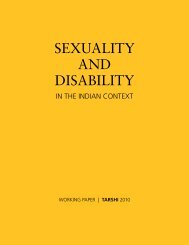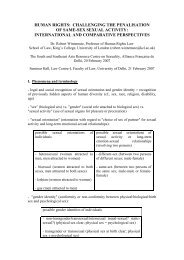People with Disabilities in India: From Commitment to Outcomes
People with Disabilities in India: From Commitment to Outcomes
People with Disabilities in India: From Commitment to Outcomes
You also want an ePaper? Increase the reach of your titles
YUMPU automatically turns print PDFs into web optimized ePapers that Google loves.
<strong>to</strong> the new asha workers under the National Rural Health Mission <strong>to</strong> schools and communities<br />
themselves. A key need will be simple <strong>to</strong>ols which allow for screen<strong>in</strong>g and referral of at-risk<br />
<strong>in</strong>fants and children. Pilot exercises underway <strong>in</strong> a number of develop<strong>in</strong>g countries provide a<br />
model which is worthy of more systematic use <strong>in</strong> <strong>India</strong>, and has already been effective on a<br />
localized basis <strong>in</strong> <strong>India</strong> through <strong>in</strong>itiatives such as Samadhan’s community worker model of early<br />
screen<strong>in</strong>g <strong>in</strong> poor areas of Delhi. The Ten Question Screen<strong>in</strong>g Instrument developed by WHO<br />
based on extensive develop<strong>in</strong>g country pilots is outl<strong>in</strong>ed <strong>in</strong> Box 3.1.<br />
3.46. (b) Attitudes and knowledge of health service providers: As <strong>with</strong> education,<br />
provider attitudes <strong>to</strong> PWD can have significant impacts on their access <strong>to</strong> health services. This is<br />
an area that <strong>to</strong> date has received less attention than attitudes among education professionals.<br />
However, the limited available evidence <strong>in</strong>dicates that provider attitudes seem <strong>to</strong> be a constra<strong>in</strong>t<br />
on PWD access <strong>to</strong> health services. Research from hospitals throughout Orissa found that less<br />
than 40 percent of providers were aware of entitlements under the PWD Act, and that close <strong>to</strong> 40<br />
percent of them considered PWD as a burden. In Gujarat, many village health workers did not<br />
know that mental illness and retardation were disabilities. The existence of attitud<strong>in</strong>al barriers<br />
receives support from the UP and TN survey also, which found that 16 percent of PWD did not<br />
seek health services due <strong>to</strong> provider attitudes. In addition, field research from Karnataka and<br />
Rajasthan <strong>in</strong>dicates a generally low level medical awareness among health care providers of<br />
disability issues, <strong>in</strong> particular <strong>with</strong> respect <strong>to</strong> mental health. 79 F<strong>in</strong>ally, articulation of demand by<br />
district and sub-national governments for health services for PWD is poor. This is partly due <strong>to</strong><br />
the fact that - <strong>in</strong> a system that is struggl<strong>in</strong>g <strong>to</strong> respond <strong>to</strong> overall health issues - disability has little<br />
priority, and partly because disability is subsumed <strong>with</strong><strong>in</strong> the preventive programs.<br />
3.47. (b) Attitudes and knowledge of health service providers: As <strong>with</strong> education,<br />
provider attitudes <strong>to</strong> PWD can have significant impacts on their access <strong>to</strong> health services. This is<br />
an area that <strong>to</strong> date has received less attention than attitudes among education professionals.<br />
However, the limited available evidence <strong>in</strong>dicates that provider attitudes seem <strong>to</strong> be a constra<strong>in</strong>t<br />
on PWD access <strong>to</strong> health services. Research from hospitals throughout Orissa found that less<br />
than 40 percent of providers were aware of entitlements under the PWD Act, and that close <strong>to</strong> 40<br />
percent of them considered PWD as a burden. In Gujarat, many village health workers did not<br />
know that mental illness and retardation were disabilities. The existence of attitud<strong>in</strong>al barriers<br />
receives support from the UP and TN survey also, which found that 16 percent of PWD did not<br />
seek health services due <strong>to</strong> provider attitudes. In addition, field research from Karnataka and<br />
Rajasthan <strong>in</strong>dicates a generally low level medical awareness among health care providers of<br />
disability issues, <strong>in</strong> particular <strong>with</strong> respect <strong>to</strong> mental health. 80 F<strong>in</strong>ally, articulation of demand by<br />
district and sub-national governments for health services for PWD is poor. This is partly due <strong>to</strong><br />
the fact that - <strong>in</strong> a system that is struggl<strong>in</strong>g <strong>to</strong> respond <strong>to</strong> overall health issues - disability has little<br />
priority, and partly because disability is subsumed <strong>with</strong><strong>in</strong> the preventive programs.<br />
79 Bhambani, op.cit. Low levels of knowledge among health care providers is not of course restricted <strong>to</strong><br />
disability, as recent studies even from urban centres such as Delhi have shown (Hammer and Das, 2005),<br />
but the lack of knowledge on disability-specific issues appears particularly pronounced.<br />
80 Bhambani, op.cit. Low levels of knowledge among health care providers is not of course restricted <strong>to</strong><br />
disability, as recent studies even from urban centres such as Delhi have shown (Hammer and Das, 2005),<br />
but the lack of knowledge on disability-specific issues appears particularly pronounced.<br />
-51-










